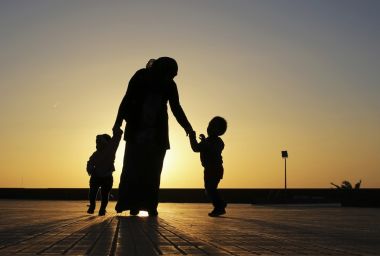Paedophile doctor went on church trip to African orphanage

A doctor who has admitted abusing 18 children in his care went on a church mission visit to an African orphanage.
Myles Bradbury made the trip with fellow members of the KingsGate Community Church in Peterborough to help children whose parents had died from Aids, it emerged yesterday.
Police say there is no evidence to suggest Bradbury offended while visiting Bulembu in Swaziland and both KingsGate and the Mission organisation insist he did not have unsupervised access to children.
However the BBC claims two unnamed sources on the mission trip say Bradbury did spend time alone with children at the orphanage.
The case raises important issues for the church community, says Justin Humphreys of the Churches' Child Protection Advisory Service (CCPAS).
Paediatrician cancer consultant Myles Bradbury abused boys at Addenbrooke's Hospital in Cambridge, between 2009 and 2013.
Ten days after his return from the KingsGate mission trip in 2012 he abused two children in a single day.
In September Bradbury, 41, from Herringswell, Suffolk, pleaded guilty at Cambridge Crown Court to 25 offences including sexual assault and possessing more than 16,000 indecent images. Bradbury's two-day sentencing hearing begins today (Friday). He has been told to expect a long sentence.
The 12-day church mission - part of the Bulembu Community Development Project - was to help more than 300 children whose parents died from Aids in the former asbestos mining town.
KingsGate Community Church leadership team released a statement in response to the BBC story. It reads: "We are shocked and deeply saddened at the actions of Dr Myles Bradbury and at the devastating impact that these have had on the lives of many.
"Dr. Bradbury attended Sunday services at KingsGate Community Church, Cambridge for around six months from 2012-13 but had no involvement in children's work at the church.
"He was part of a team that visited the Bulembu Community Development Project, Swaziland, for 12 days in November 2012.
"As soon as the charges against Dr Bradbury were revealed in early July 2014, we promptly contacted Bulembu. Bulembu then instituted a detailed investigation to make sure that he had not had any one-to–one contact with children during that time.
"They found no evidence that he had any unsupervised involvement with children and was always accompanied by Community Development Project staff."
A detailed statement in response to the BBC allegations from the Ministry team that runs the orphanage in Swaziland claims it had 'stringent protocols in place which limit the potential for this kind of predatory behaviour.'
The statement reads: "After extensive investigations we are confident that similar atrocities were not perpetrated by Dr. Bradbury against any children in our care.
"Due to the nature of our work, we have to view every visitor with some caution, not granting freedom nor access to the children. Therefore, our policy on interaction and supervision is stringent and grows even more stringent, year by year. We also work with volunteer teams and team leaders to better assess prospective teams and team members."
Justin Humphreys, Head of Safeguarding at CCPAS told Christian Today there are lessons to be learnt from the story.
"This raises a whole range of issues. Firstly clearly there's an awful lot of volunteering activity that takes both from established charitable organisations but also local churches in terms of international mission activity. And it's right and necessary that it happens.
"The difficulty these sorts of situations raise is the danger that people underestimate the potential risks."
Mr Humphreys said it is good practice not to allow any individual the chance to be alone with children on missional visits overseas.
"When you talk about codes of conduct and expectation around behaviour it's about setting clear boundaries for the volunteers and others who are on mission teams to say if you find yourselves in this situation it presents a real risk both to you and sometimes to children and you should seek to do everything you can to avoid those situations from occurring. So it places the responsibility firmly in the hands of the individual team member.
"Really planning these mission trips in advance and taking full account of safeguarding implications is absolutely essential."
He added that sex offenders may not necessarily be known to the authorities.
"What we do know from information that has been gathered and analysed by CEOP – the child exploitation and online protection centre, is that the majority of individuals who offend in this way are not known or registered sex offenders, they can be individuals who are volunteering and who are taking the opportunity to commit what is known as transient sex offending activities. There's a huge amount that needs to be understood here.
"As far as the church response to this goes I'm not sure that we should be less trusting as a community...the approach that we should be taking is one described by Lord Laming in his inquiry report following the death of Victoria Climbie and that it is that we should always view these situations and individuals concerned with a level of 'respectful uncertainty'. So always approaching these situations with the view that abuse and harm to children is possible, both in an organisational context but also in relation to any individual and therefore the same rigorous processes and expectations need to be applied to everybody.
"The Church in some senses can be particularly vulnerable because of the desire to be open to all, the desire to be wanting to see the best in people to forgive individuals for past misdemeanours – and that undoubtedly on occasion is exploited by individuals who know that and see that as an opportunity.
He added that CCPAS can support churches in thinking about the risks and providing training.











